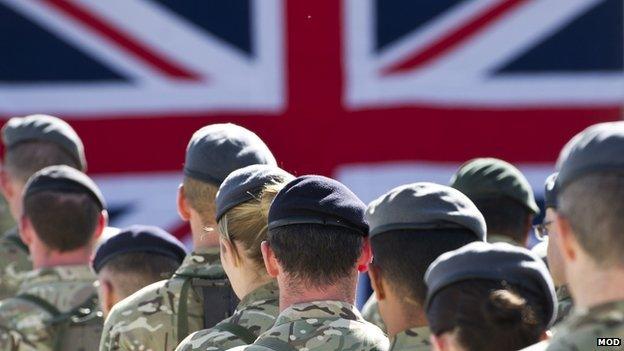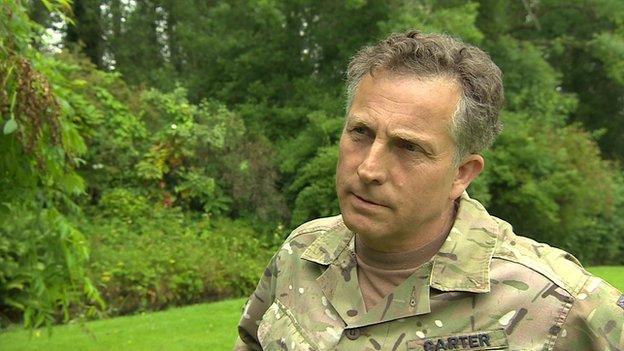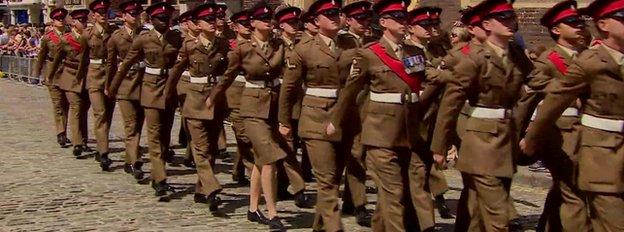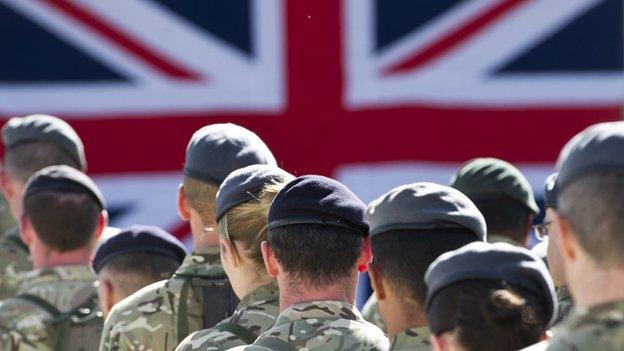Army head condemns 'unacceptable' sexual harassment
- Published

Army chief General Sir Nick Carter says the level of sexual harassment being faced by female soldiers is "totally unacceptable".
In a survey commissioned by the Army, almost 40% of servicewomen said they had received unwanted comments of a sexual nature in the past year.
The report, based on a survey of 7,000 soldiers, found 13% of women had had "a particularly upsetting experience".
About 3% of those who were very upset made a formal written complaint.
Nearly half did not make a formal complaint because they were concerned about the consequences, such as being labelled a troublemaker and the effect it might have on their career.
Sir Nick said he was "disappointed" by the figures.

General Sir Nick Carter says the issue is "essentially one of culture"
"But they do provide me with a baseline from which I can move forward and change the Army's culture," he told the BBC.
He said he wanted the Army to be a "modern, inclusive" employer and the change would come from the top down, with the launch of a new code of leadership in September.
He also said he would ensure the complaints process was "good and sound", so "all people feel they can complain if it is necessary to complain".
'Common part'
According to government statistics, external, over the past few years the proportion of women in the UK forces has been rising across all three services; the Royal Navy, the Army and the Royal Air Force.
In July 2014, there were 15,780 women serving across the armed forces - or 10% of the total number of personnel.


Analysis by Jonathan Beale, BBC defence correspondent
The fact the head of the Army commissioned this survey suggests he knows he has a problem. One that he wants to tackle to change the Army's culture and make it more inclusive.
General Sir Nick Carter has already made clear he needs to attract more women, as well as people from the ethnic minorities. To meet his recruitment targets the British army must be seen as an attractive career, open to all.
Later this year he'll bring together the Army's leadership to set out a new code of conduct and to modernise the Army's values to better reflect society.
The culture change won't be easy. Women currently make up about 10% of the Army's ranks. Muslims account for less than 1% of the Army's strength.
But barriers are slowly being broken down. Last week the Army appointed its first female two star general.
Next year it'll decide whether to lift the ban on women serving in the infantry.

The Army-commissioned report found servicewomen were more likely to experience a range of "unwanted, targeted sexualised behaviours" than servicemen, with the exception of being sent sexually explicit material.
Junior soldiers were, in some cases, four times more likely than senior officers to experience the behaviours, the report said, and the most at-risk group was junior-ranking women.
Among the report's findings:
39% of women and 22% of men said they had received unwelcome comments about their appearance, body or sexual activities
33% of women and 19% of men said someone had made unwelcome attempts to talk to them about sexual matters
12% of women and 6% of men said someone had made unwelcome attempts to touch them
13% of women said they had had a "particularly upsetting experience"
61% said the incidents had occurred in their home base or training unit
62% said they had ignored the behaviour; 53% said they avoided the person responsible
It also found that 44% of respondents believed sexual harassment was a problem in some parts of the Army, but the majority were positive about how well the Army tried to prevent it and manage it when it did happen.
Service personnel asked for a more effective complaints system and stronger sanctions against those who sexually harassed others.
The report recommended introducing more transparency into the complaints and discipline process, and better training for senior staff.
"The Army may wish to consider introducing training to give individuals the skills, knowledge and confidence to managed unwanted behaviours themselves," it added.
The report found "generalised sexualised behaviours", such as the use of sexual swear words and sexual jokes, was a "common part of workplace culture and the Army is no exception" but the majority of personnel were unlikely to be offended.
Researchers posted 24,000 anonymous surveys to regular and reserve servicemen and women, and more than 7,000 were sent back - a response rate of 30%.
Focus groups were also conducted with 48 randomly-selected non-commissioned officers from different units.
- Published19 May 2015
